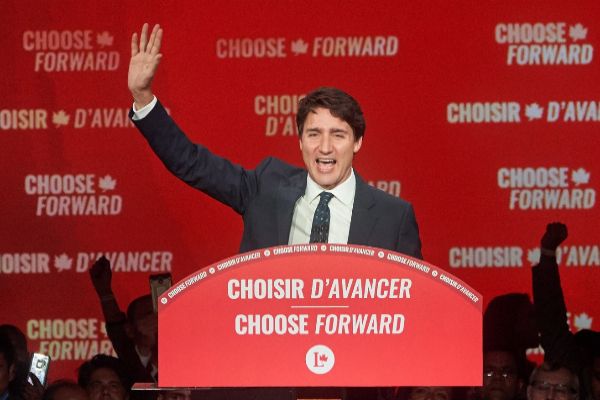- Results.Trudeau wins the elections in Canada but loses the majority
Canadian Prime Minister Justin Trudeau has already entered Canadian History with capital letters. Although, probably, not where he would have liked it. The member of the Liberal Party - a party that generally stands at the center left of the country's political spectrum - is going to be the prime minister with less popular support in Canadian History since that country held its first elections 142 years ago.
In the end, the transformation of the Canadian policy promised by Trudeau is summed up in three words. One: fragmentation of the electorate, something common to the entire West in recent years. The other, something characteristic of Canada's oldest policy: the regionalization of the vote. And the third, a phenomenon that is occurring especially in Anglo-Saxon countries such as the United States of Trump and the Great Britain of Brexit: the division of society between large cities and rural areas.
Those seem to be the main conclusions of yesterday's elections. Trudeau is going to form a government despite losing the elections. His Liberal Party has barely achieved 33.1% of the votes, six and a half points less than in 2015. Above him is the Andrew Scheer Conservative Party, with 34.4% of the ballots. But Trudeau will be able to form a government thanks to Jagmeet Singh's New Democratic Party (NDP) getting 15.9% of the vote.
The Canadian electoral system favors, as in Spain or the US, parties with a stronger local presence, as well as liberals, despite having obtained fewer votes than conservatives - also called 'tories', as in Britain - of Scheer, they've got many more seats. When its representation is added with that of the NDP, 172 seats are left in the federal Parliament of Ottawa. It is a meager majority: just two more than necessary to achieve the absolute majority. But in politics, that's enough. Trudeau also has the possible support of the Greens, which are the only left-wing party that has risen - albeit a little - and has three seats. More complex is the situation created by the resurgence of the Québec Block, the party of the Francophone province of Quebec, which doubles its number of seats. Its leader Jean-François Blanchet, has a mood close to the liberals. But on the eve of the elections he has taken the spectrum of independence, which can make him a complicated government partner.
Trudeau has reacted with euphoria to the results. "You are sending the liberal team to Ottawa again with a clear mandate: we will continue to make life more economically affordable, we will continue to fight climate change, we will keep firearms out of our streets, and we will continue to invest in all Canadians," he said last night. when the first results pointed to his victory.
Reasons for satisfaction are not lacking: he has survived image and corruption scandals, and a part of the electorate does not forgive him for what he considers abandoning some of the key promises of his campaign. In return, the prime minister can boast of having opened the Canadian labor market to qualified immigrants from around the world - just at a time when his southern neighbor, the US, closes their doors - creating a tax on emissions from gases that contribute to climate change, and governed a growing economy.
And, perhaps Trudeau's main victory is that, with the exception of the Quebeques Bloc nationalists, everyone has lost. True, the liberals, who have left more than six points in relation to 2015, are the most affected. But Scheer's conservatives have barely managed to climb 2.6 percentage points . And the NDP has experienced a small catastrophe, falling almost four points, to 15.9% of the vote. A Liberal-NDP coalition is a union of losers against one that has not really won: the Conservative Party.
Which leads to the other conclusion of these elections: the territorialization of Canadian politics. The Liberal Party has been literally erased from the map of the oil provinces of Alberta and Saskatchewan , which have given their mass support to the 'tories', and the rural regions of British Columbia, a province that, outside the city of Vancouver is fundamentally a succession of mountains in the middle of the Rockies.
According to the criteria of The Trust Project
Know more- Justin Trudeau
- Canada
CanadaJustin Trudeau plays his political future
Politics Rudeau wins the elections in Canada but loses the majority
Politics The leader of Podemos in Castellón shows loyalty to Iglesias but praises Errejón's commitment

